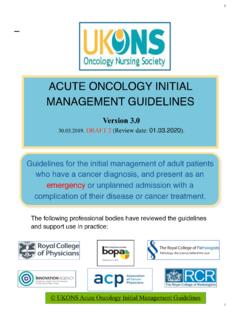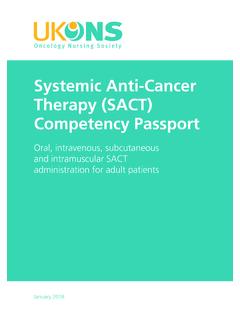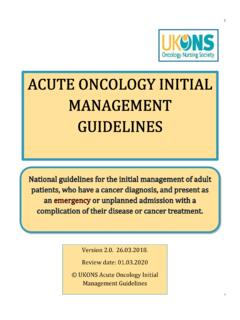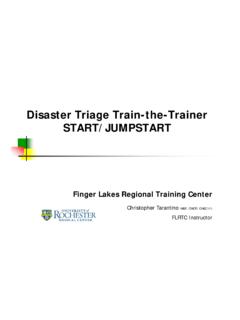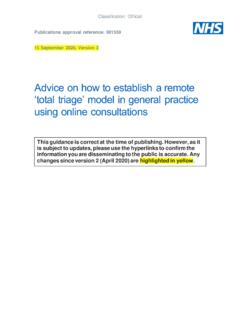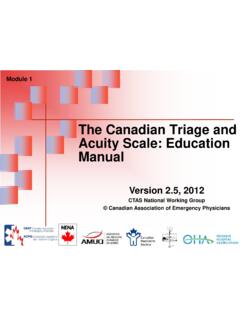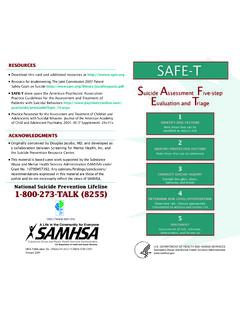Transcription of Oncology/Haematology 24 Hour Triage - UKONS
1 1st EditionOctober 2010 Information and Instruction ManualThe UKONS Toolkit has been developed for use by all members of staff who may be required to man 24-hour advice lines for patients who: Have received or are receiving systemic anticancer therapy Have received any other type of anticancer treatment, including radiotherapy and bone marrow graft May be suffering from related immunosuppression ( acute leukaemia, corticosteroids) Adolescent patients treated within adult units ARE included in this pathwaySystemic anticancer therapy is an overarching term encompassing all systemic anti cancer therapies including chemotherapy, immunotherapy and supportive therapies 2nd Edition November 2016 Oncology/Haematology24 Hour TriageRApId ASSESSMENT ANd AccESS of assessment and guidelines, recommendations and and UKONS Toolkit content, application and for Alert Triage Pathway Algorithm and Clinical Triage Assessment Process and Tool Triage Log and competency assessment record15 References18 Review Group20 Consultation Group21 Appendix 1 Table of Changes23 Appendix 2 Skills for Health information24 This publication contains information, advice and guidance.
2 It has been developed for use within the UK, and readers are advised that practices may vary in each country and outside the information in this manual has been compiled from professional sources. It provides a guideline for practice and is dependent on the clinical expertise and professional judgement of the registered practitioner who uses it. Whilst every effort has been made to ensure the provision of accurate and expert information and guidance, it is not possible to predict all the circumstances in which it may be used. Accordingly, the authors shall not be liable to any person or entity with respect to any loss or damage caused or alleged to be caused directly or indirectly by what is contained in or left out of this information and 24 Hour Triage Rapid Assessment and Access ToolkitOncology/Haematology 24 Hour Triage Rapid Assessment and Access Introduction The UK Oncology Nurses Society ( UKONS ) 24-Hour Triage Tool is a risk assessment tool that uses a Red, Amber and Green (RAG) scoring system to identify and prioritise the presenting problems of patients contacting 24-hour advice lines for assessment and advice.
3 It is a tool for use by all members of staff who may be required to man a 24-hour advice lines for patients who: Have received or are receiving systemic anticancer therapy Have received any other type of anticancer treatment, including radiotherapy and bone marrow graft May be suffering from disease/treatment related immunosuppression ( acute leukaemia, corticosteroids) This guideline provides recommendations for best practice for the appropriate treatment and management of patients who contact the 24-hour advice line; it should be used in conjunction with the Triage practitioner s clinical judgment. The original UKONS Toolkit was developed by the Central West Chemotherapy Nurses Group, a sub-group of UKONS , and was reviewed and endorsed by: UKONS The National Patient Safety Agency (NPSA) Macmillan Cancer Support The Society and College of Radiographers have participated in the review and update of the tool and have added their UKONS Toolkit was subject to a multi-centre pilot, which resulted in an extremely positive original version of the tool for the Triage of adults was successfully launched in 2010.
4 It is now widely used across the UK and internationally for the telephone assessment and Triage of patients who may be suffering from side effects associated with systemic anticancer therapy, radiotherapy or 2 of the UKONS Toolkit was released for use in 2016, following a multi-disciplinary review and update. This review was prompted by the use of new systemic anticancer therapies including immunotherapies, and a wish by the authors and users to ensure that it remains fit for purpose in light of these recent advances in treatment. The Triage and assessment process remains unchanged. A small number of amendments and additions have been made to the assessment tool and log sheet. These additions cover some of the new toxicities/problems that may occur with immunotherapies and also take into account the lengthened side-effect profile of these drugs.
5 The review group also took this opportunity to add some additional questions and prompts to both the assessment tool and log sheet to aid the Triage practitioner in his/her decision making (appendix 1, p23).This Information and Instruction Manual provides: Rationale for use A brief description of the development and review history Examples of The Toolkit contents Instructions for use Governance and user responsibilities Competency frameworkThis information and instruction manual is essential reading for anyone wishing to use or implement the UKONS Toolkit in the purposes of this document, oncology and haemato-oncology services will be referred to as 24 Hour Triage Rapid Assessment and Access Toolkit2 The original development group recognised that there was commonly a lack of relevant guidelines and training to support members of the clinical team who were undertaking telephone assessment of patients, and often no consistent approach to Triage either across or within organisations.
6 The group found that the advice and support provided was reliant on the experience and knowledge of the nurse or doctor answering the call, and that although there were local models of good practice they had not generally been validated. There were no tested assessments or decision-making tools in use. Furthermore, documentation and record keeping differed from trust to was little published evidence regarding Oncology/Haematology Triage . Quality of assessment and adviceThe assessment and advice given regarding a potentially ill patient is crucial in ensuring the best possible outcome. Patient safety is an essential part of quality care with each and every situation being managed appropriately. The function of telephone Triage is to determine the severity of the caller s symptoms and direct the caller if appropriate to an emergency assessment or initiate clinical follow Telephone Triage is an important and growing component of current oncology practice; we must ensure that patients receive timely and appropriate responses to their Successful Triage will consistently recognise emergencies and potential emergencies, ensuring that immediate assessment and required interventions are arranged.
7 Sujan4 found that the most frequent recommendation for improving communication was standardisation through procedure checklists and appropriate training in their use. All of the above are used within the UKONS Toolkit. National guidelines, recommendations and reportsThere are no national guidelines in place to support training, standardisation and consistency of Oncology/Haematology Triage . However, there are national recommendations regarding the provision of telephone Triage service: The Manual for Cancer Services recommends that all cancer patients receiving systemic anticancer therapy should have access to a 24-hour telephone advice The World Health Organisation (WHO) recommends that organisations use a standardised approach to handover and implement the use of the Situation, Background, Assessment and Recommendation process (SBAR).
8 6,7 This recommendation stresses in particular consideration of the out-of-hours handover process, and emphasises the need to monitor compliance. Standardisation may simplify and structure the communication, and create shared expectations about the content of communication between information provider and The Cancer Reform Strategy8 identified winning principles that should be applied in the care of cancer patients: Unscheduled (emergency) patients should be assessed prior to the decision to admit. Emergency admission should be the exception, not the norm Patients and carers need to know about their condition and symptoms to encourage self-management and to know who to contact when neededPatients have the right to be treated with a professional standard of care, by appropriately qualified and experienced staff, in an approved or registered organisation that meets required levels of safety and quality.
9 The UKONS Toolkit uses the SBAR principles, which offer a structured method for communicating critical information that requires immediate attention and action contributing to effective escalation and increased patient 24 Hour Triage Rapid Assessment and Access Aims and objectivesThe aim of the UKONS Toolkit is to provide guidelines that can be adopted as a standard; it will deliver: Guidance and support to the practitioner at all stages of the Triage and assessment process A simple but reliable assessment process Safe and understandable advice for the practitioner and the caller High quality communication and record keeping Competency-based training An audit toolThe UKONS tool has been developed for use by all members of staff who may be required to take 24-hour advice line calls from patients who: Have received or are receiving systemic anticancer therapy Have received any other type of anticancer treatment, including radiotherapy and bone marrow graft May be suffering from disease/treatment - related immunosuppression ( acute leukaemia, corticosteroids) Teenagers and Young Adults (TYA) with cancer should be cared for within a dedicated TYA unit, which may be associated with a either service for children, or for adults.
10 If they are treated in a TYA unit associated with a children s service, the Children and Young Peoples (CYP) version of the Triage tool should be used. Where they are treated within an associated adult service this version of the tool should be UKONS Toolkit is an educational tool and includes a competency assessment framework that all disciplines of staff would need to complete prior to undertaking advice line UKONS Toolkit does not address patient management post admission, nor does it contain admission pathways. It does, however, support recommendation for acute assessment by the practitioner who has carried out the Triage . Males 9guidelines for the provision of telephone advice in primary care stressed the importance of risk management/mitigation and clinical governance in the provision of safe and high quality telephone factors to consider when developing such a service are: Training Triage Documentation Appropriateness and safety Confidentiality CommunicationThe UKONS Toolkit addresses all key factors above.
